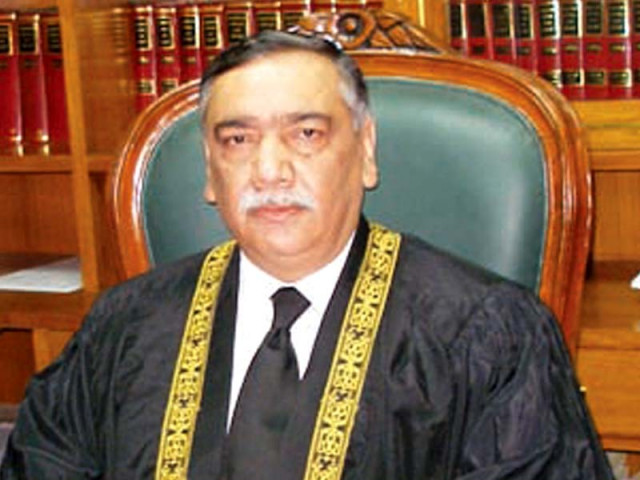SC's changed approach to public interest cases
Unlike his predecessor, CJP Asif Saeed Khosa has not taken any suo motu notice in his five months

Justice Asif Saeed Khosa.
Neither the CJP Khosa has taken any suo motu notice nor entertained any case forwarded by the SC Human Rights Cell, a trend which was at its peak during tenure of his predecessor Mian Saqib Nisar. The CJP Khosa also does not seek reports from departments concerned on matters of public interest.
The SC Human Right Cell policy has also apparently changed and it is not entertaining those applications, in which grievances could be redressed by any other forum. Pending applications in the cell have already been disposed of.
Now the SC institution branch raises objections to every constitution petition. When the petitioners file appeal against rejection of the petition an SC judge hears their appeal in his chamber and passes appropriate order.
Acquittal only reversed if blatantly perverse: SC
The CJP Khosa in his first speech on January 17 said an effort shall be made – either through a full court meeting or through a judicial exercise – to determine and lay down the scope and parameters of the exercise of the original jurisdiction of the court under Article 184(3).
He had even called the full court to consider amendment in order XXV Supreme Court Rules relating to the exercise of powers under Article 184 (3) of the Constitution as proposed by the Supreme Court Bar Association (SCBA) last year.
However, consensus among SC judges had yet to evolve about determination of suo motu parameters. The matter may be taken up on judicial side soon, sources said.
Active lawyer Umer Gilani told The Express Tribune that in case of any 184(3) petition filed in the Supreme Court, perhaps the most important question is that of admissibility.
“In my view, this question should be decided by a panel of judges in open court. At present the question of admissibility is decided either by the registrar or by the CJP in his chambers. This creates an impression of opaqueness and arbitrariness, which is detrimental to the court's reputation.”
Gilani said the proper forum for most writs is the high court and direct hearing before the SC under 184(3) reduces one lawyer of appeal which is important for ensuring due process of law.
However, an insider revealed that after two months there will be a visible change in the apex court’s policy for entertaining human rights cases. “You will see big change in the SC’s policy to entertain public interest matters in the next couple of months,” said a senior official in the SC.
Currently, the incumbent CJP is totally focusing on improving criminal justice in the country and clear backlog of cases. Justice Khosa has been successful in his approach and all criminal appeals in the apex court will be decided in next couple of months.
Only four constitution petitions entertained
During the five months tenure of incumbent CJP, only four constitution petitions have been entertained. One petition has been filed by the local government’s representative of the federal capital seeking devolution of powers to the metropolitan corporation and union councils of the district in view of Article 140-A of the Constitution.
The second petition has been moved by the Pakistan Bar Council representative Raheel Kamran Sheikh requesting the court to facilitate the live-streaming or broadcasting of the apex court’s proceedings when dealing with matters of public concern.
The third constitution petition is moved by some social activists through renowned lawyer Faisal Siddiqui requesting to appoint a broad-based and independent commission to investigate whether hundreds of extrajudicial killings allegedly carried out under the supervision of former police officer Rao Anwar were genuine encounters or not.
The fourth petition has been filed by Gilgit Balistan Bar Association challenging appointments of senior officials in Gilgit-Baltistan Supreme Appellate Court. The petition is filed by Arif Chaudhry advocate.



















COMMENTS
Comments are moderated and generally will be posted if they are on-topic and not abusive.
For more information, please see our Comments FAQ